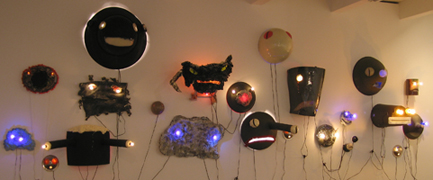Sara Mackenzie Talk
Sara Mackenzie is given a talk tomorrow in our Colloquium Series:
Sara Mackenzie (McGill University)
Time: 3.30pm
Place: Ferrier Building, room 456
Title: Ordering Restrictions in Aymara: the role of contrast and markedness
Sara Mackenzie is given a talk tomorrow in our Colloquium Series:
Sara Mackenzie (McGill University)
Time: 3.30pm
Place: Ferrier Building, room 456
Title: Ordering Restrictions in Aymara: the role of contrast and markedness
On March 18, Aditi Lahiri and Henning Reetz will be giving talks at McGill.
1.30pm CLRMB Distinguished Lecture
Rosalind and Morris Goodman Cancer Research Centre, Montreal
1160, av. des Pins Ouest, Room 501
Aditi Lahiri (Oxford University): WORDS: asymmetries in representation, processing and change
More …Abstract:
Language systems abound in asymmetries — in inventories, representations and rules. These asymmetries affect language processing and language change. For instance, it is most unusual to have equal number of consonant and vowel phonemes in any given language; languages has retroflex nasals also include dental/alveolar nasals.Velar obstruents become coronals in the context of high front vowels, but never the other way around; nuclear phrasal stress in a neutral sentence is always assigned on the last phonological phrase, never the first one. The question we raise in this talk is how are these asymmetries constrain phonological and morphological representations of WORDS in the mental lexicon, and how these constraints affect language processing and change. I will address asymmetries in various phonological domains: featural contrasts, morphophonological opacity and sentence phonology, providing theoretical and experimental evidence from behavioural as well as brain imaging studies in German, English and Bengali, covering both language comprehension as well language production planning.
Talking about crowdsourcing, this looks like it’s going to be an interesting workshop at this years LSA institute:
Full Title: Crowdsourcing Technologies for Language and Cognition
Date: 27-Jul-2011 - 27-Jul-2011
Location: Boulder, Colorado, USA
Contact Person: Robert Munro
Web Site: http://www.crowdscientist.com/workshop/
Linguistic Field(s): Computational Linguistics; Text/Corpus Linguistics
Call Deadline: 01-Mar-2011
Meeting Description:
This workshop will bring together linguists who are utilizing crowdsourcing technologies and those who want to know more about them. It combines a half-day ‘how-to’ session where participants will learn to conduct experiments using crowdsourcing platforms and a half-day workshop where researchers come together to share results, ideas, and strategies.
It is being held in conjunction with the 2011 LSA Summer Institute.
Call for Papers:
We are eliciting abstract submissions for afternoon presentations. They should present either:
a) Novel empirical results in linguistics or the language sciences that have been enabled by internet-based crowdsourcing technologies, or b) novel approaches to data collection and evaluation, especially when there are no ‘correct’ responses to a given stimuli. Crowdsourcing technologies could include technologies like Amazon’s Mechanical Turk, CrowdFlower, online games, collaborative platforms like instant messaging and Wikipedia, or custom software built for collecting language and cognition data. Talk slots will be 10-15 minutes, depending on scheduling.
Please send 250-word abstracts to crowdscientistgmail.com by March 1st, 2011. Do not include author names or affiliations in the abstracts as reviewing will be blind (but list the authors and affiliations in the email itself). Abstracts can be in plain text or PDF. You may optionally include figures, tables and/or references. They will not count towards the 250 words, but please limit the entire submission to one page.
McGill Canadian Conference for Linguistics Undergraduates
Submission Deadline: February 25 2011
Date: 11-Mar-2011 - 13-Mar-2011
Malcolm Gladwell has an interesting article about college education rankings in the current New Yorker. The problem with college rankings, he argues, is that they try to accomplish too much at the same time: rank very different institutions along multiple dimensions. The effect is that decisions about the weighting of the different factors lead to very different rankings, and it is the interests or ideological biases of those who conduct the study and determine the weights.
More …The 10th International Conference for Psycholinguistics, to be held at the Basque Center for Cognitive Science in Sebastian, extended the deadline until December 21.
Three weeks ago me and a good friend were standing in front a piece of art by Jon Pylypchuck at the museum of contemporary art in Montréal. The exhibition is still on until January 4th, and I recommend checking it out.

So looking at one of the faces, my friend asked the following question, which to me was very confusing:
"Do you think this is a frown or a moustache?"
More …You get to decide here.
A post on mindhacks reports on a 1974 study on writer’s block, replicated in 2007. The study has a lot of parallels with Fiengo & Lasnik’s 1972 squib in Linguistic Inquiry on unrecoverable deletion in syntax. I wonder in how many fields similar studies were published, and when it started.

There have been two interesting blog posts on scientific literacy recently on the bps digest. The first addresses how to present findings in ways that minimizes a ‘scientific impotence response,’ where people discard scientific findings because they are incompatible with their world view by resorting to claiming that a certain topic cannot be properly studied scientifically. The second post discusses how one can try to present findings effectively in order to debunk pseudo-scientific beliefs.